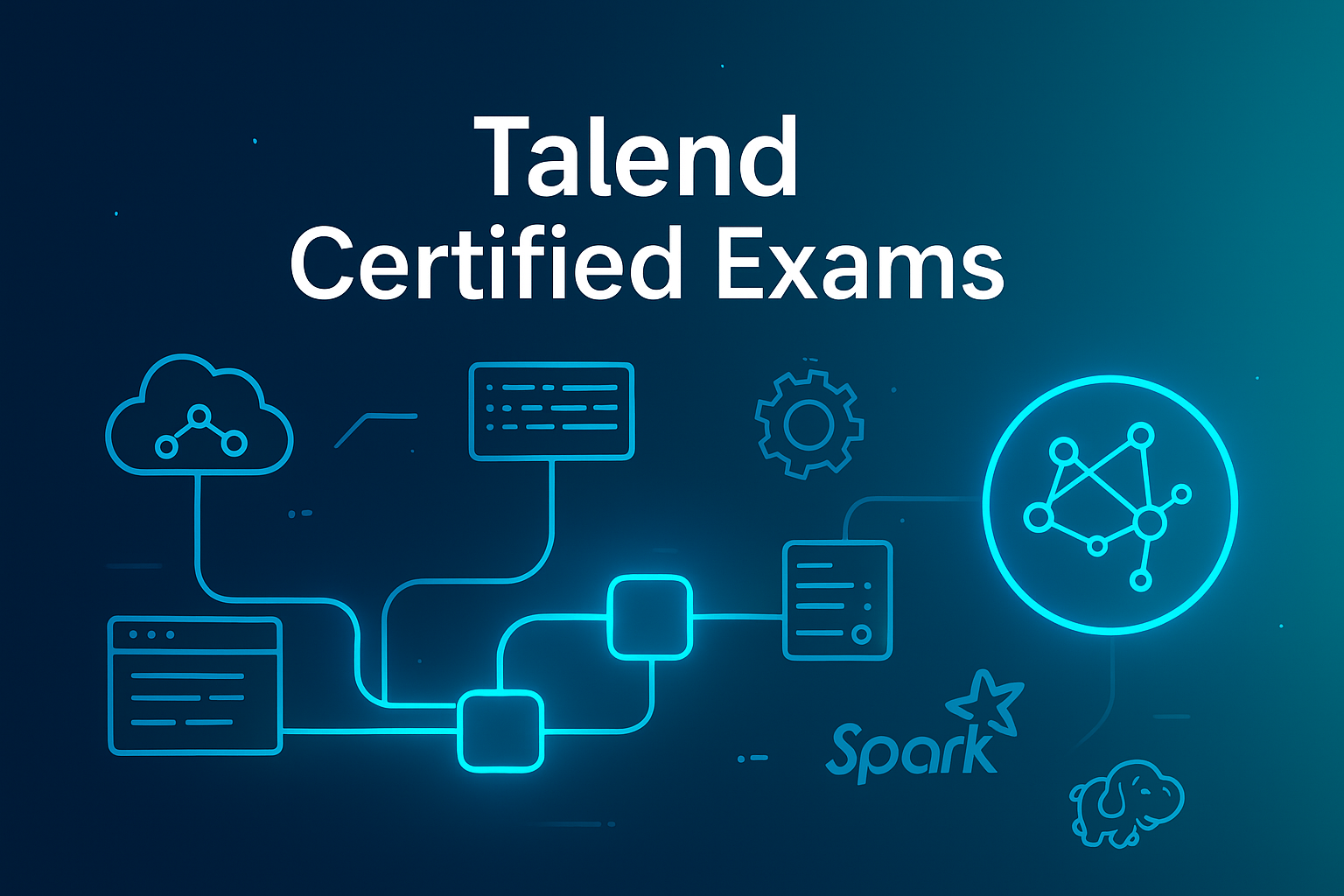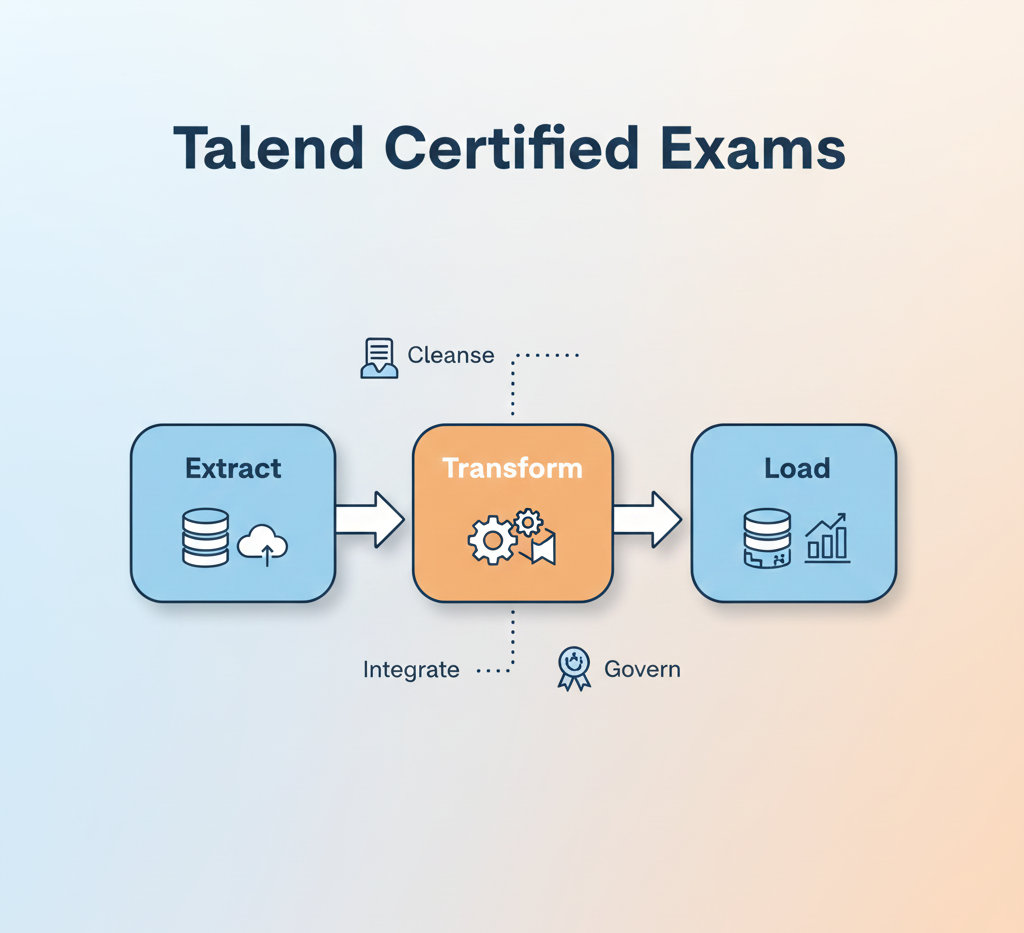Talend certifications have become a powerful way for data professionals to validate their skills in integration, transformation, cloud pipelines, and enterprise data workflows. As organizations move toward hybrid cloud environments and distributed data ecosystems, expertise in Talend’s platform has grown more valuable than ever. Talend Certified exams help engineers build credibility and demonstrate their ability to work with modern data pipelines that support analytics, governance, and operational workloads.
Today’s data-driven businesses require systems capable of handling real-time ingestion, multi-source connectivity, high-volume processing, and seamless cloud integration. This shift has transformed how data engineering roles are defined. Instead of purely ETL-focused responsibilities, modern engineers must understand orchestration, automation, quality enforcement, and end-to-end data lifecycle management. Talend certifications align directly with these expectations, offering structured learning paths that reflect real-world operational needs.
Whether you are expanding beyond foundational ETL knowledge or targeting advanced data engineering skills, Talend Certified exams provide a supported pathway to develop and validate your expertise.
To explore more pathways for Talend Certified exams, you can click here to find structured learning directions.
Why Talend Certification Skills Matter in Today’s Data Landscape?
Data environments have become significantly more complex. Organizations now operate across multi-cloud setups, containerized architectures, API-driven communication, and streaming integrations. Talend’s ecosystem allows engineers to design workflows that function reliably across these diverse environments. Certification ensures you can apply these tools correctly, efficiently, and securely.
Talend Certified exams help you:
Work confidently with cloud and hybrid data pipelines
Design optimized ETL and ELT flows for large datasets
Maintain data quality and governance across systems
Automate recurring integration tasks
Support enterprise-scale ingestion and transformation workloads
Without certified-level skills, data engineering knowledge often remains too shallow to handle modern integration complexity.
Understanding the Main Categories of Talend Certifications
Talend offers certifications focused on both core data integration and cloud-based workflows. Each exam targets a different capability area, allowing engineers to specialize based on their career direction.
1. Talend Data Integration Certification
This certification validates your ability to build, configure, and troubleshoot ETL workflows using Talend Studio. It covers transformations, components, metadata handling, and performance optimization.
2. Talend Big Data Certification
Big Data certification focuses on integrations with Hadoop, Spark, and distributed architecture pipelines. It’s ideal for engineers working with high-volume or high-speed processing environments.
3. Talend Cloud Certification
Cloud-focused exams test your knowledge of Talend Cloud applications, API integrations, remote engines, cloud pipelines, and deployment management.
4. Talend Data Quality & Governance Certification
This specialization covers profiling, stewardship, matching, deduplication, lineage management, and quality-driven automation.
5. Talend Real-Time & API Integration Certification
Engineers studying this specialization focus on service-based integrations, API flows, microservices, and real-time data movement.
Each certification path helps shape your competency for supporting modern enterprise-grade data architectures.
How Talend Certifications Support Career Growth?
Earning a Talend certification opens up new technical and professional opportunities. Employers value certified talent because they can trust their ability to manage data processes end-to-end. Talend Certified professionals typically move into roles that involve higher responsibility, deeper architectural thinking, and broader decision-making.
With certified skills, you gain:
Higher technical confidence
Access to mid- and senior-level engineering roles
The ability to design complete integration solutions
Greater efficiency in troubleshooting and optimization
A professional edge in competitive hiring environments
As organizations continue expanding their data ecosystems, the demand for certified engineers continues to rise.
How to Choose the Right Talend Certification Path?
Your long-term goals and your current experience level determine which Talend certification is the best fit. If you enjoy building transformation pipelines, data integration is a strong starting point. If you prefer distributed systems, Big Data certification may align with your interests. For those drawn to cloud architectures, Talend Cloud certification offers strong career potential.
Ask yourself:
Do I prefer working with cloud-native integration patterns?
Am I interested in high-volume or distributed data processing?
Do I enjoy automation, orchestration, and system optimization?
Do I want to specialize in data governance and quality operations?
Do I work in environments requiring real-time integration patterns?
Your answers help determine the certification that best aligns with your strengths and career vision.
Building Skills Through Hands-On Experience
Talend cannot be mastered through theory alone. Real hands-on practice is essential for understanding how components behave, how jobs interact, and how pipelines perform under different conditions.
You can gain practical experience using:
Local Talend Studio environments
Cloud integration sandboxes
Spark and Hadoop simulation environments
API integration labs
Data governance testing frameworks
Hands-on exposure strengthens your ability to build reliable, scalable pipelines and prepares you for complex exam scenarios.
Why Certifications Strengthen Talend Expertise?
Talend Certified exams validate your technical capability and demonstrate consistency in your approach to integration design. Certifications like Talend Data Integration, Talend Cloud, and Talend Big Data provide structured learning paths and help employers gauge your readiness for advanced engineering roles. They also reflect your commitment to continuous learning in a field that evolves rapidly.
Whether you're studying independently or using preparation platforms, certification ensures you remain aligned with industry standards and best practices.
Using Practice Questions to Improve Exam Logic
Talend exams frequently include scenario-based questions that require strong analytical thinking, not just memorization. These questions may include transformation scenarios, connection patterns, performance challenges, and cloud-based automation sequences.
Practice questions help you build:
Scenario interpretation skills
Correct sequencing of integration logic
Ability to eliminate misleading answer choices
A deeper understanding of troubleshooting patterns
Many candidates use preparation resources such as Cert Empire, known for detailed exam-style practice material that reinforces real exam behavior.
Last but Not Least
Talend Certified exams help professionals build the advanced skills needed to support modern data ecosystems. Whether you're focusing on cloud-native workflows, high-volume processing, quality governance, or API-driven architectures, Talend certifications open doors to strong career paths. With steady study, consistent hands-on practice, and exposure to real project environments, any data professional can build deep Talend expertise and thrive in today’s evolving data landscape.
We recently discussed in a Facebook update, and you can read that post here.
FAQs
1. What is the best Talend certification for beginners?
The Talend Data Integration Certification is the ideal starting point for beginners. It focuses on core ETL concepts, components, transformations, and metadata handling, making it the best foundation before exploring cloud or big data certifications.
2. How long does it take to prepare for a Talend Certified exam?
Preparation time varies based on experience, but most candidates take 4–8 weeks of consistent study. Hands-on practice in Talend Studio or Talend Cloud significantly shortens the learning curve and improves exam readiness.
3. Do Talend Certified exams include practical, hands-on tasks?
Some exams may include scenario-based questions that simulate real workflows, but most are structured as multiple-choice questions. These questions still require a practical understanding of how components behave in real environments.
4. Can I pass Talend exams without working experience?
Yes, but real hands-on practice is highly recommended. Setting up labs, experimenting with components, and recreating common integration patterns helps you understand concepts that are difficult to learn through theory alone.
5. Are practice questions useful for Talend exam preparation?
Absolutely. Practice questions strengthen exam logic, improve scenario interpretation, and help familiarize you with the structure of Talend Certified exams. They also highlight weak areas that need additional review.
Explore More:
https://ezinearticle.org/advanced-networking-specializations-building-high-level-skills-for-modern-infrastructure-147740.html


